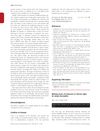 11 citations,
January 2022 in “Journal der Deutschen Dermatologischen Gesellschaft”
11 citations,
January 2022 in “Journal der Deutschen Dermatologischen Gesellschaft” Alopecia areata is a chronic condition causing hair loss, with new treatments targeting the immune system showing promise.
4 citations,
January 2018 in “Journal of dermatology & dermatologic surgery” There is no gold standard treatment for hidradenitis suppurativa due to insufficient evidence.

Hidradenitis Suppurativa has genetic links, with certain gene mutations more common in patients and a third of cases having a family history.
 January 2023 in “Indian Dermatology Online Journal”
January 2023 in “Indian Dermatology Online Journal” No single ideal JAK inhibitor for alopecia areata has been determined; JAK3 inhibitors may be promising with fewer side effects.
 November 2017 in “British Journal of Dermatology”
November 2017 in “British Journal of Dermatology” The electronic version of the Dermatology Life Quality Index is as effective as the paper version, with most patients preferring it.
 19 citations,
January 2021 in “Experimental dermatology”
19 citations,
January 2021 in “Experimental dermatology” Acne inversa is an epithelial-driven disease where inflammation is caused by cyst rupture, and treatments should focus on preventing tendril growth for better results.
 116 citations,
December 2017 in “International Journal of Women's Dermatology”
116 citations,
December 2017 in “International Journal of Women's Dermatology” Adult female acne treatment should be personalized, considering individual preferences and pregnancy, using various topical and oral medications while managing side effects and resistance.
 27 citations,
March 2018 in “Allergy and asthma proceedings”
27 citations,
March 2018 in “Allergy and asthma proceedings” People with alopecia areata often have higher rates of allergies and autoimmune diseases.
 18 citations,
June 1999 in “Statistical Methods in Medical Research”
18 citations,
June 1999 in “Statistical Methods in Medical Research” The document concludes that PK/PD modeling is important for determining the safe and effective dosages of drugs.
 12 citations,
August 2019 in “Dermatitis”
12 citations,
August 2019 in “Dermatitis” Dupilumab for skin problems might reactivate hair loss in some patients.
 3 citations,
July 2021 in “International journal of environmental research and public health/International journal of environmental research and public health”
3 citations,
July 2021 in “International journal of environmental research and public health/International journal of environmental research and public health” Two patients developed complete hair loss after Alemtuzumab treatment for MS, with no regrowth after two years.
 August 2024 in “JAMA Dermatology”
August 2024 in “JAMA Dermatology” Continuous baricitinib is needed to keep hair regrowth in severe alopecia areata.
 November 2017 in “British Journal of Dermatology”
November 2017 in “British Journal of Dermatology” Genes controlling hair growth and immune response are disrupted in male pattern baldness.
 66 citations,
March 2018 in “British journal of dermatology/British journal of dermatology, Supplement”
66 citations,
March 2018 in “British journal of dermatology/British journal of dermatology, Supplement” An imbalance between certain immune cells is linked to a chronic skin condition and may be influenced by obesity, smoking, and autoimmune issues.
 23 citations,
October 2018 in “Expert Opinion on Drug Safety”
23 citations,
October 2018 in “Expert Opinion on Drug Safety” Consider benefits and risks of new alopecia treatments for safety.
 20 citations,
November 2019 in “Biomolecules”
20 citations,
November 2019 in “Biomolecules” Finasteride reduces response to stress and rewards, affecting behavior and mental health.
 16 citations,
September 2020 in “British journal of dermatology/British journal of dermatology, Supplement”
16 citations,
September 2020 in “British journal of dermatology/British journal of dermatology, Supplement” The article suggests that targeting specific immune pathways could help control and treat the skin disease hidradenitis suppurativa.
 1 citations,
July 2023 in “Cutis”
1 citations,
July 2023 in “Cutis” Scalp rolling might help regrow hair in people with a hair loss condition called Alopecia Areata.
 April 2024 in “Medical & clinical research”
April 2024 in “Medical & clinical research” More research is needed to find the best long-term treatments for Alopecia Areata.
 January 2024 in “Revista de la Asociación Colombiana de Dermatología y Cirugía Dermatológica/Revista de la Asociacion Colombiana de Dermatologia y Cirugia Dermatologica”
January 2024 in “Revista de la Asociación Colombiana de Dermatología y Cirugía Dermatológica/Revista de la Asociacion Colombiana de Dermatologia y Cirugia Dermatologica” Baricitinib successfully treated severe hair loss.

Combining epinephrine with a steroid may help regrow hair in severe alopecia areata cases.
 January 2019 in “ARC journal of pharmaceutical sciences”
January 2019 in “ARC journal of pharmaceutical sciences” Acne can be managed with various treatments and requires psychological support due to its emotional impact.
 July 2018 in “Elsevier eBooks”
July 2018 in “Elsevier eBooks” Up to half of people experience itchy scalp, often due to skin conditions like seborrheic dermatitis or psoriasis, and treatments vary based on the specific cause.
 March 2018 in “Suez Canal University Medical Journal”
March 2018 in “Suez Canal University Medical Journal” New drugs targeting the JAK-STAT pathway show promise for treating inflammatory skin diseases.
 61 citations,
January 2015 in “Hormones”
61 citations,
January 2015 in “Hormones” Liraglutide caused significant weight loss in some obese women with PCOS, especially those with severe obesity and insulin resistance.
 49 citations,
December 2018 in “JAAD case reports”
49 citations,
December 2018 in “JAAD case reports” Dupilumab may cause significant hair loss, which can reverse after stopping the drug.
 25 citations,
December 2018 in “Human Molecular Genetics”
25 citations,
December 2018 in “Human Molecular Genetics” The document concludes that certain mutations may contribute to the inflammation in hidradenitis suppurativa and suggests that targeting TNFα could be a treatment strategy.
18 citations,
September 2021 in “Journal of Neuroendocrinology” Neurosteroids can influence behavior by modulating brain inhibition, with potential for treating psychiatric disorders.
 6 citations,
October 2022 in “American journal of clinical dermatology”
6 citations,
October 2022 in “American journal of clinical dermatology” The review shows how to properly diagnose and treat the loss of eyebrow and eyelash hair.
 4 citations,
November 2023 in “Frontiers in immunology”
4 citations,
November 2023 in “Frontiers in immunology” New treatments targeting T-cell pathways are needed for better alopecia areata management.




























